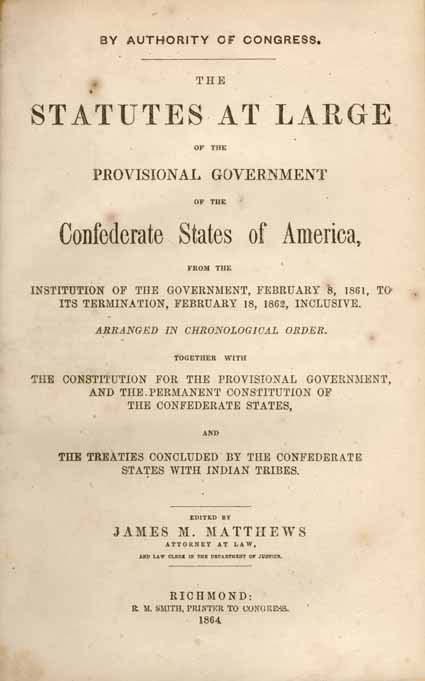 On March 11, 1861, the Confederate States of America adopted the Confederate States Constitution. This document followed the same format as the United States Constitution and in many cases quoted it verbatim. There were also however many key differences. Some of the larger disparities deal with states’ rights and slavery. We will list some of these variations as part of the information that follows. The Constitution of the Confederate States remained in effect until the end of the Civil War. A Provisional Confederate Constitution was in place for approximately one month prior to the final version being adopted. The original document is on display at the University of Georgia.
On March 11, 1861, the Confederate States of America adopted the Confederate States Constitution. This document followed the same format as the United States Constitution and in many cases quoted it verbatim. There were also however many key differences. Some of the larger disparities deal with states’ rights and slavery. We will list some of these variations as part of the information that follows. The Constitution of the Confederate States remained in effect until the end of the Civil War. A Provisional Confederate Constitution was in place for approximately one month prior to the final version being adopted. The original document is on display at the University of Georgia.
Confederate States of America
Alabama, Arkansas, Florida, Georgia, Kentucky, Louisiana, Mississippi, Missouri, North Carolina, South Carolina, Tennessee, Texas, and Virginia.
States’ Rights
Beginning with its Preamble, the Confederate States Constitution made it clear that each state would maintain its own sovereignty and independence. This was an immediate departure from the Constitution of the United States concerning the scope of each separate state’s ability to govern itself.
Some specific key differences in the area of states’ rights are listed below:
» The ability for states to agree to treaties between one another as to the use of waterways.
» Each state had the right to individually tax ships.
» Bills of credit could be issued.
» The impeachment of federal judges and officers practicing within their state.
» The Confederate Congress would determine state taxes.
Slavery
The first thing that stands out in the differences between the two Constitutions is the terminology. The United States Constitution never used the term slave. Instead, they referred to these individuals as “Persons held to service or labor.” The Confederate Constitution had no such qualms, calling these people “slaves.”
Other examples of slavery as defined by the two Constitutions follows:
» No restrictions to the rights of sojourn or traveling slave owners between Confederate states.
» The Confederate States of America allowed the importation of African slaves.
» Confederate States inability to abolish slavery.